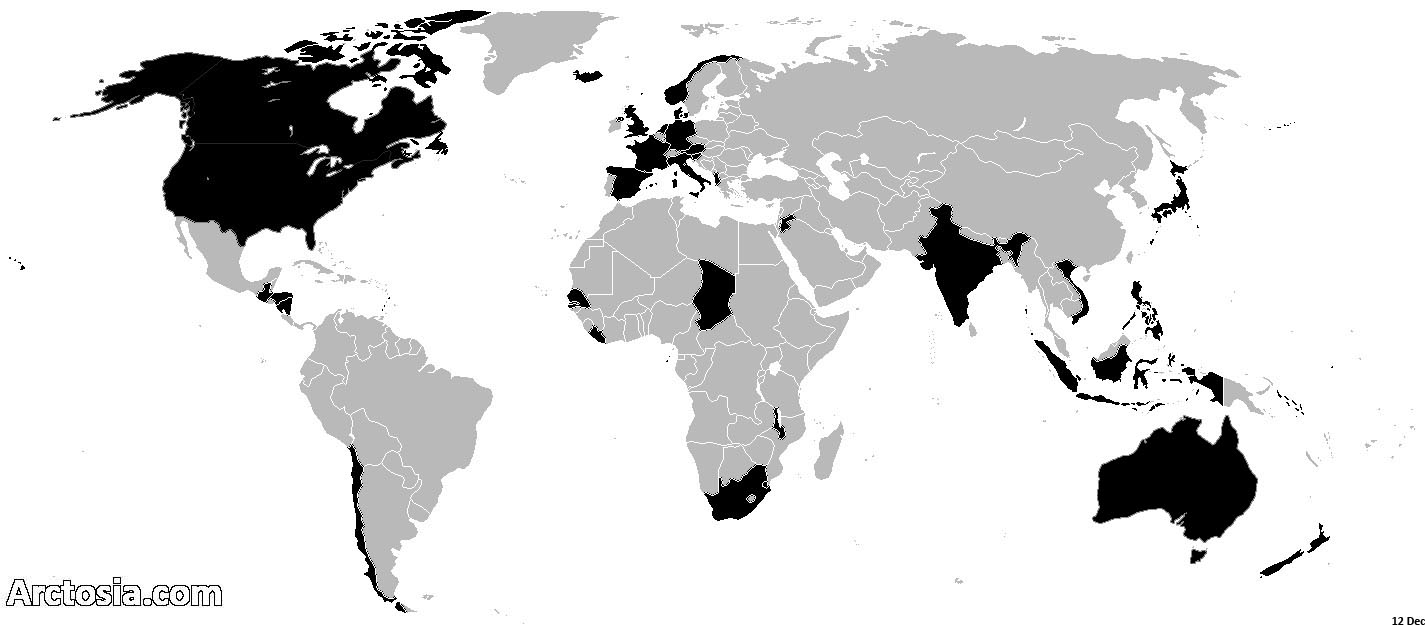The Word of the Week comes from the Grass-Mud Horse Lexicon, a glossary of terms created by Chinese netizens and encountered in online political discussions. These are the words of China’s online “resistance discourse,” used to mock and subvert the official language around censorship and political correctness.
shānghài Zhōngguórén de gǎnqíng 伤害中国人民的感情

Map of countries which have “hurt the feelings of the Chinese people.” (Source: Arctosia)
Invocation used by Chinese authorities when another country, organization, or individual offends Party officials.
Meeting with the Dalai Lama is a classic way to “hurt the feelings of the Chinese people.” After President Obama met with the Dalai Lama in July 2011, the People’s Daily complained, “To host the Dalai Lama at the same time China was celebrating the 60th anniversary of Tibet’s liberation hurt the feelings of all Chinese people, including the feelings of Tibetans.”
One need not physically meet with the Dalai Lama to “hurt the feelings of the Chinese people” in official estimation—questioning Chinese sovereignty in any form can also suffice. In January 2018, the Marriott International hotel chain allowed users to select Taiwan, Macau, Hong Kong, and Tibet as possible countries of origin in an email questionnaire. Amid a broader campaign to police online affronts to sovereignty by multinationals, the Cyberspace Administration of China, China’s top internet regulator, accused the hotelier of “seriously violating national laws and hurting the feelings of the Chinese people.” Marriott issued a public apology, and saw its website shuttered for a week in China.
Netizens may repeat this stock complaint sardonically, or turn it on its head and disavow damage to their own feelings. After Swedish activist Peter Dahlin’s televised confession contained the phrase in January 2016, colleagues said it appeared to be coerced. Following Dahlin’s confession, one Weibo user wrote:
Xiansu1981 (@限速1981): To those crooked kernels [foreigners] on CCTV claiming they have hurt the feelings of the Chinese people, let me tell you, I’m a member of the Chinese people, and my feelings haven’t been hurt by you in the least. The feelings you’ve really hurt belong to the people of Zhao. (January 20, 2016)
那些在电视上声称伤害了中国人民的感情的歪果仁,我对你讲哈,我是中国人民的一员,我的感情并没有被你伤害。你所伤害的感情应该是赵国人的。[Chinese]
In 2008, blogger “FangK” searched through the electronic archives of the People’s Daily between 1946 and 2006 and found that 19 countries and organizations had been accused of hurting the feelings of the Chinese people in its pages. Victor Mair considered the inverse in 2011, comparing the frequency of hurt Chinese feelings to those of Russians, Japanese, Jews, and other national and ethnic groups. A chapter on Chinese nationalism published by a branch of Academia Sinica (中央研究院), the national academy of Taiwan, provided a chart tracking usage of the phrase by People’s Daily between 1949 and 2013.
Columnist Kai Pan calls the hurt feelings accusation “inherently idiotic,” based on immature assumptions about the entirety of Chinese society.
No matter how pained the Chinese people’s feelings, international relations still manage to stay intact. When democracy activist Hu Jia was awarded the EU Sakharov Prize in 2008, the Chinese ambassador to Brussels wrote, “If the European Parliament should award this prize to Hu Jia, that would inevitably hurt the Chinese people’s feelings once again and bring serious damage to China-EU relations.” To date, China-EU relations are still highly functional.







